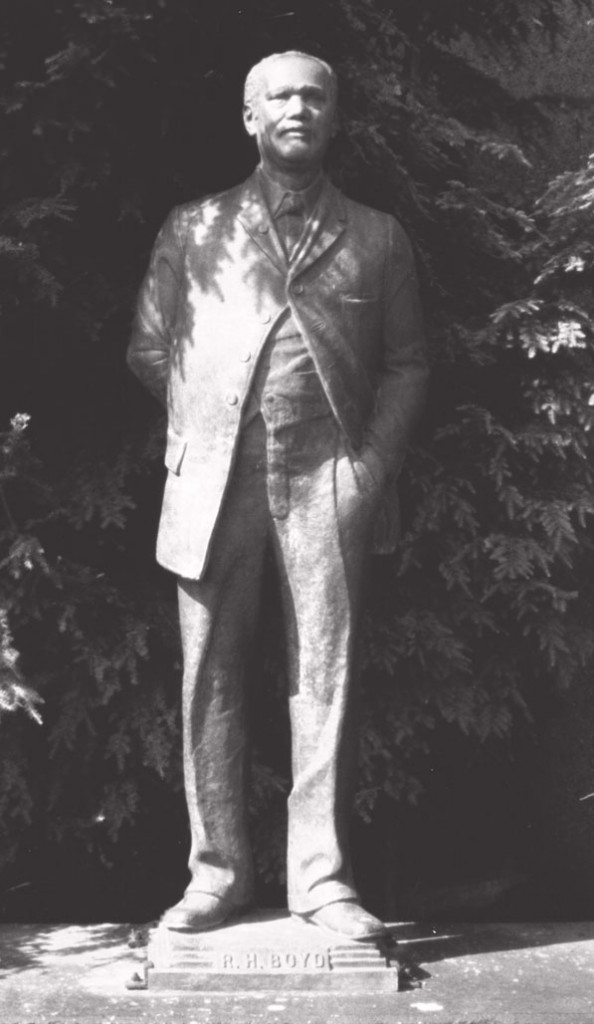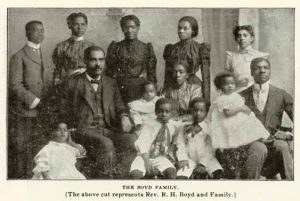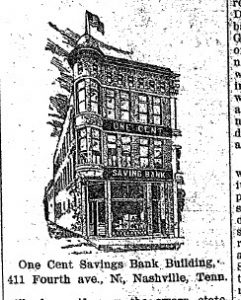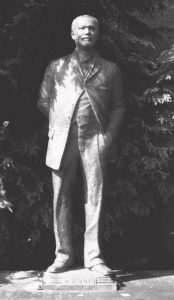
GOOD MORNING P.O.U.! We hope you’re enjoying the weekend!
We conclude our series on African-American Bankers with….
RICHARD HENRY BOYD
(1843-1922)
One-Cent Savings and Trust Company (Citizens Bank)
Nashville, TN
Richard Henry Boyd, a founder of both the National Baptist Convention and the National Baptist Publishing Board, was born in Texas late in the antebellum era. After receiving an education at Bishop College, an institution for black Baptist men supported by white northern Baptists, in Marshall, Texas, Boyd moved to Nashville in the mid-1890s and became instrumental in the formation and early years of the National Baptist Convention. In 1896 Boyd and a group of nine other men chartered the National Baptist Publishing Board. Over the next twenty-five years, it grew into the nation’s largest African American publishing enterprise. Boyd’s company supplied black churches with religious literature, church pews, church fans, and a variety of other items for church life. The board and its subsidiary agencies employed over 110 African American workers, making it a substantial black enterprise. Boyd also either started or supported the National Negro Doll Company, the first business to market black dolls to black consumers; the One-Cent Savings Bank, a financial institution which met the needs of small African American depositors; the Globe Publishing Company, which published the Nashville Globe, the city’s black newspaper; the National Baptist Union-Review, an African American denominational newspaper; and the Home Mission Board of the National Baptist Convention, which distributed religious literature and supported missionary efforts.

As vice-president of the National Negro Business League, Boyd represented the trend in African American thought that supported Booker T. Washington’s philosophy of “industrial education” and emphasized the acquisition of property and economic independence. At the same time, as early as the 1890s, Boyd warned his fellow black Tennesseans that whites intended to turn the clock back on black civil rights. When Nashville began enforcing segregated street cars in the 1900s, Boyd and fellow ministers and businessmen supported a boycott of the public transportation, thus initiating a tradition of political protest. Meanwhile, they attempted to counter segregation by forming the Union Transportation Company, a black-owned streetcar franchise. The boycott and the company eventually failed, but Boyd cemented his reputation as a “race man” through his work in fighting Jim Crow.
In the last decades of his life, Boyd became involved with an ugly controversy over the independence of his major business, the National Baptist Publishing Board. In 1915 Boyd and the forces affiliated with him split from the National Baptist Convention over this issue and formed the National Baptist Convention of America. Boyd’s latter years were spent in fighting internal denominational battles. But this did not prevent him from continuing to comment on issues of the day, including the beginnings of the great African American migration out of the South during and after World War I. Boyd died in 1922, but through the legacy of the National Baptist Publishing Board his influence lives on.

Citizen’s Bank
In business since 1904, Citizens Bank is the oldest continuously operated African American bank in the United States. In 1902 Richard H. Boyd, James C. Napier, and other Nashville African American leaders formed a chapter of the National Negro Business League (NNBL) to promote black business interests. African Americans in Nashville had had no bank since the collapse of the Freedmen’s Savings Bank and Trust Company (1865-74), and white banks treated black customers with indifference and disdain. On November 5, 1903, nine executive committee members of the local NNBL met at attorney James C. Napier’s office and agreed to establish a bank. A week later, seven others joined, and they founded the One Cent Savings Bank and Trust Company with sixteen hundred dollars in capital. The One Cent Savings Bank opened on January 16, 1904, in the Napier Court Building at 411 North Cherry Street.
The principal founders and officers included such important Nashville leaders as Richard Henry Boyd (president), James C. Napier (cashier-manager), and Preston Taylor (chairman). C. N. Langston (teller), J. B. Bosley, William Haynes, J. W. Grant, E. B. Jefferson, T. G. Ewing, and J. A. Cullom were other key officers and founders. The One Cent Bank helped finance the African American civil rights cause in 1906 when it served as the depository for the Defense Fund of the Afro American Council.
Organized for the uplift of African Americans, Citizens Bank survived the Great Depression because Boyd and his successor operated the institution with efficiency and frugality. According to Boyd, bank stockholders understood “that this institution was born out of necessity. It is not . . . a loan company, an investment and industrial insurance company, not a pawn shop, and the idea of ‘getting rich quick’ was never in the minds of the officers of this institution.” (1) In 1920 One Cent Savings Bank’s name changed to Citizens Savings Bank and Trust Company to give it a more populist appeal. In February 1922 Citizens Bank moved to the Colored YMCA building on Cedar Street. Seven years later, the Journal of Negro History and the Pittsburgh Courier paid tribute to Citizens Bank’s twenty-five years of service. At its 1958 meeting the National Bankers Association awarded an Outstanding Certificate of Achievement to Citizens Bank.
The bank’s leadership remained stable after the deaths of Boyd, Napier, and Taylor. Henry A. Boyd served as both president (1922-59) and chairman (1931-59) and was succeeded as chairman by T. B. Boyd Jr. (1959-79) and T. B. Boyd III (1979-present). Since July 1959 Citizens Bank has employed a full-time president, and those to have held the office include Meredith G. Ferguson, Richard Lewis, Henry Hill, Rick Davidson, Deborah Scott Ensley and current president, Dr. Deborah A. Cole. Today, Citizens Bank operates a main branch on Jefferson Street, a branch on Monroe Street, and a headquarters and operations building on Heiman Street in Nashville.
(SOURCE: The Tennessee Encyclopedia of History and Culture)
For more information on Citizens Bank, visit their website here.
The Case of the Missing Statue

Police: R.H. Boyd statue likely chopped up, sold as scrap metal
Police believe a stolen bronze statue of publishing company founder R.H. Boyd has been chopped up and sold to a metals facility in Kentucky for a few hundred dollars.
The 6-foot-3-inch statue of the founder of R.H. Boyd Publishing Company in West Nashville went missing overnight on Dec. 5. The statue had been outside the business on 6717 Centennial Blvd. since 1974.
Metro Nashville Police Department spokesman Don Aaron said the perpetrators received several hundred dollars for the minced up 400-pound statue.
The seller was required to present identification and police are in the process of locating a suspect.
The name of the metal facility is not being released due to the ongoing investigation.

